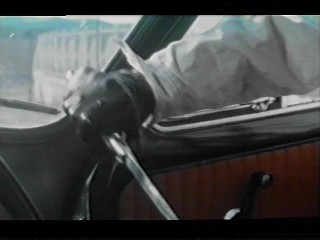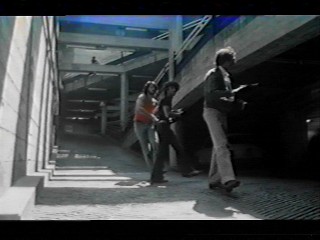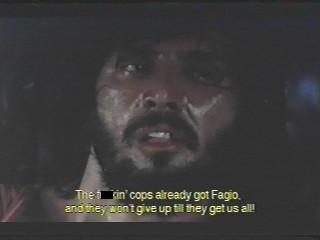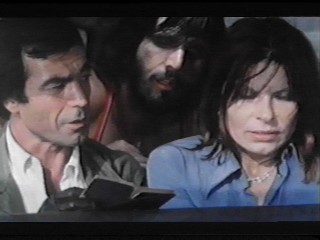
|
|
|
|
|
|
|
|
|
|
|
|
|
(a.k.a. Kidnapped) (1974) Director: Mario Bava
It's interesting to note that although Mario Bava received fame all over the world during his lifetime for the horror movies he made, like Black Sunday, Bay Of Blood, and Blood And Black Lace, his fellow Italians (at least when he was alive) weren't as enthusiastic, partly due to the fact that his countrymen weren't into horror movies as much as people in other countries. Italians simply saw him as a "horror director", though in fairness the view of Bava in other countries usually didn't go beyond the label, "a talented horror director". In fact, Bava didn't just direct horror movies in his lifetime; in his filmography you can find, among other non-horror movies of his, the goofy comedy Dr. Goldfoot And The Girl Bombs, the spaghetti western Roy Colt And Winchester Jack, and the sword and sandal Hercules In The Haunted World. Obviously, Bava wasn't afraid to tackle any genre, though even today he's still seen by most people as a talented horror director. Had Rabid Dogs received a theatrical
release at the time
it was made, I think people would see him as a talented director,
period.
Some of you probably know the sad story surrounding this drama; for Seeing the finished effort, it's obvious that Spera worked very hard to complete the movie as close to Bava's vision as possible, though it's also obvious that they weren't able to fix everything. The movie has become slightly grainy-looking after being on the shelf so long, and it's obvious Bava didn't even get the chance to do some post-production shoots; several times we don't see the middle part of a full action someone or something does, and the editing jump on occasion does momentarily confuse you. Of course, one had to realize the circumstances this movie went through, and since the rest of the movie is so engrossing, I think that after a few minutes you won't notice the grainy look, and you'll forgive the occasional editing hiccup. After that newly filmed prologue (the meaning of which
remains a mystery
until the very end), the movie starts off with a bang, immediately
immersing
us with action and the feeling of desperation. Four hardened criminals
waiting outside a major corporation for the payroll delivery to arrive,
immediately pouncing for the prize as soon as the delivery car stops at
the front steps. Although the robbery goes well for the four hoodlums, things immediately start to go wrong during their escape. The one who is driving is killed by a policeman's bullet, and another bullet shot into their gas tank soon has them without transportation. Fleeing on foot and with the cops at their heels, Doc (Poli), Blade (Don Backy), and the oddly named Thirty-two (George Eastman) take desperate actions. They first take passerby Maria (Lander) hostage, then when they see the car of Riccardo (Cucciolla), a man who is driving his comatose son to the hospital, they barge in and demand he drives them out of the city. It's a daunting task for Riccardo, for he soon finds out not only does he have to avoid the cops, he has to deal with the threat of the hoodlums. Though Doc acts cool and may be open to bargaining, Blade and (especially) Thirty-two are clearly psychotic, and their harassment of the already hysterical Maria may soon go beyond talk. As well, the threat of harm to the boy - who is already ill - doesn't help matters... From this point on, almost all of the remainder of the
movie has the
characters stuck in the car as it makes its way down the highways and
back
roads. You might think that the movie soon becomes boring, since the
characters
are mostly stuck in one place - it doesn't. Imagine yourself in
Riccardo's
place, coming up to a tollbooth when you have a woman It's not just the problems that pop up that keep us engrossed, but the characters as well. Riccardo attempts a dangerous balancing act of doing what he can to please the criminals while trying to bargain with them. Doc is not the typical stupid thug, and comes across as fairly intelligent. At one point, he responds to one of Riccardo's eager-to-please statements by saying, "You say that because you are afraid. But if you had half a chance, you'd kill us all." But the most compelling characters are Thirty-two and Blade. Though they don't seem completely evil at the beginning of the journey (despite their murderous ways), your opinion of them gets darker the further the movie progresses because of the way they treat Maria. Interestingly, most of their vile behavior towards Maria is not physical abuse, but mental - throughout the journey they mentally torture her in many different ways, including one humiliation sequence in the middle of the movie that's somewhat hard to watch. Their actions towards her kept reminding me of Last House On The Left, and my research of the movie after watching it uncovered I was not the first person to be reminded of that other movie. The torture Maria goes through is just one example of
the movie's downbeat
viewpoint. No one manages Aside from the restoration problems I discussed earlier, the only other problem I found with the movie was with the Stelvio Cipriani score. Though effective, it was too repetitive for my taste, and at one point plagiarizes Iron Butterfly's In-A-Gadda-Da-Vida (!) At least the score isn't too overbearing, so the problems with it can be ignored easily enough to concentrate on the characters and the various situations they find themselves in, and the movie remains a very good one even when you take account of all the flaws. It's too bad that Bava never lived long enough to see Rabid Dogs get released, or even get wind that it would finally get released. But at least it did finally get released, and despite its problems, it was well worth the wait. Hopefully, its completion and release may inspire some party to get Jerry Lewis' concentration camp movie The Day The Clown Cried out of the vault once and for all. Check for availability on Amazon (DVD) See also: Abducted 2, Phoenix, Tomorrow Never Comes |
 those
who don't, a brief and superficial explanation: Bava had almost
finished
filming this drama (which was shot in a somewhat guerilla fashion),
when
one of the people who was financing the movie died, cutting off
essential
funding. The subsequent financial and legal wrangling over the
uncompleted
movie resulted in it being shelved for over twenty years, until the
Spera
Cinematografica film company (headed by one of the stars of Rabid
Dogs, Lea Lander) managed to retrieve, restore, and complete
the
movie, which included filming an opening credits prologue that Bava
planned
but never got to do.
those
who don't, a brief and superficial explanation: Bava had almost
finished
filming this drama (which was shot in a somewhat guerilla fashion),
when
one of the people who was financing the movie died, cutting off
essential
funding. The subsequent financial and legal wrangling over the
uncompleted
movie resulted in it being shelved for over twenty years, until the
Spera
Cinematografica film company (headed by one of the stars of Rabid
Dogs, Lea Lander) managed to retrieve, restore, and complete
the
movie, which included filming an opening credits prologue that Bava
planned
but never got to do.
 Though edited much
too quickly (I had to watch the sequence
twice to figure exactly how the robbery was pulled off), you still get
a good glimpse as to just how ruthless these criminals are, especially
when the bag man refuses to let go of the money bag. Actually, here and
elsewhere in the movie, Bava mostly restrains his depiction of violence
for once; people do get shot and stabbed, but Bava refrains from
showing
us the wounds being created, showing us the blood and wounds
afterwards.
The style of the violence sequences is still clearly Bava, even for
someone
who wasn't told this was one of his movies. When we get a quick
close-up
shot of black gloved hands poised for the kill while holding a
switchblade,
nobody but Bava could have done that.
Though edited much
too quickly (I had to watch the sequence
twice to figure exactly how the robbery was pulled off), you still get
a good glimpse as to just how ruthless these criminals are, especially
when the bag man refuses to let go of the money bag. Actually, here and
elsewhere in the movie, Bava mostly restrains his depiction of violence
for once; people do get shot and stabbed, but Bava refrains from
showing
us the wounds being created, showing us the blood and wounds
afterwards.
The style of the violence sequences is still clearly Bava, even for
someone
who wasn't told this was one of his movies. When we get a quick
close-up
shot of black gloved hands poised for the kill while holding a
switchblade,
nobody but Bava could have done that.
 in the back seat
who might crack at any minute. Or maybe the man at the tollbooth will
recognize
the criminals. Is there any way you could signal the man for help - or
would you even try, since if the criminals saw your attempt, they would
surely kill you. As well as you facing multiple problems with this
intensity,
the others in the car - not just Maria - face problems of their own
that
you can't do anything about, except pray that the problems will pass
safely
and you'll stay alive. The journey for the six seldom goes on for long
without yet another problem coming up for someone. Who says hostage
taking
has to be boring?
in the back seat
who might crack at any minute. Or maybe the man at the tollbooth will
recognize
the criminals. Is there any way you could signal the man for help - or
would you even try, since if the criminals saw your attempt, they would
surely kill you. As well as you facing multiple problems with this
intensity,
the others in the car - not just Maria - face problems of their own
that
you can't do anything about, except pray that the problems will pass
safely
and you'll stay alive. The journey for the six seldom goes on for long
without yet another problem coming up for someone. Who says hostage
taking
has to be boring?
 to generate that
much sympathy - certainly not
the criminals, but also everyone else. Maria is a weak, fragile woman,
and Riccardo mostly comes across as a wimp. Other people the six come
across
during the journey come across as lazy, annoying, and in other
unlikable
ways. The movie shows us a cynical world, where one is powerless to
change
things on their own, where you are a toy of fate. This dark view
extends
even through the ending, though not in the way that you'd expect.
to generate that
much sympathy - certainly not
the criminals, but also everyone else. Maria is a weak, fragile woman,
and Riccardo mostly comes across as a wimp. Other people the six come
across
during the journey come across as lazy, annoying, and in other
unlikable
ways. The movie shows us a cynical world, where one is powerless to
change
things on their own, where you are a toy of fate. This dark view
extends
even through the ending, though not in the way that you'd expect.